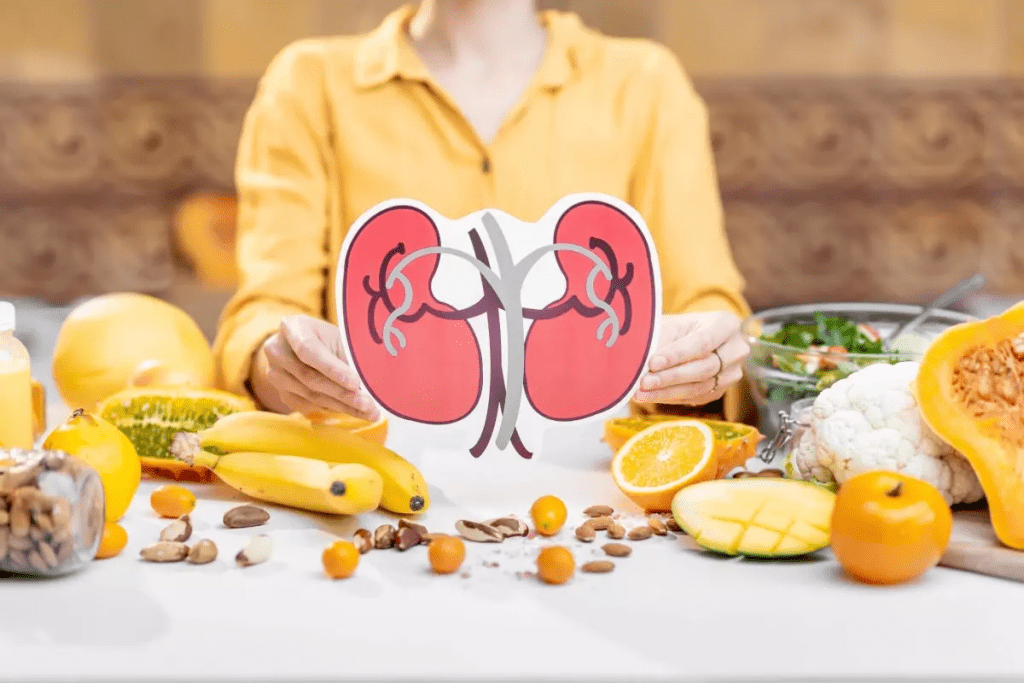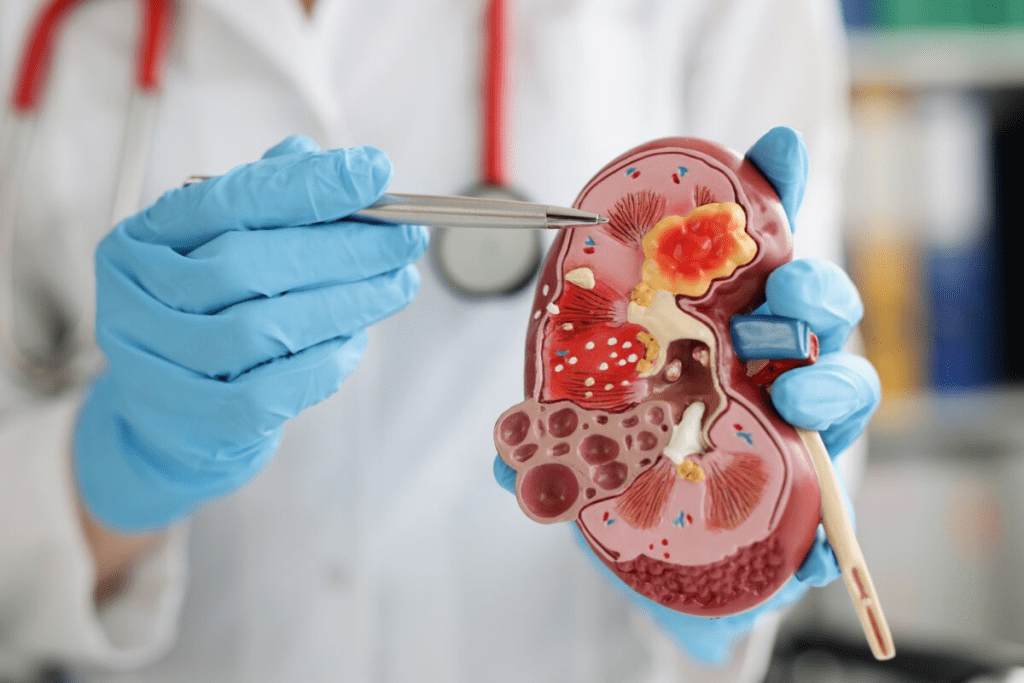Last Updated on October 31, 2025 by

Recent studies have shown that vitamins play a big role in kidney stone prevention. The National Kidney Foundation reports that nearly 1 in 10 people in the U.S. will develop a kidney stone at some point. Research highlights vitamins like B6 as an effective way to reduce this risk.
High amounts of vitamin B6 can help prevent kidney stones, especially in women. Understanding how to prevent kidney stones through proper nutrition and vitamin intake can make a big difference in your kidney health. By focusing on the right vitamins and a balanced diet, you can lower your risk and support long-term wellness.
It’s important to know how kidney stones form to prevent them. Kidney stones are hard deposits made of minerals and salts. They form inside the kidneys and are influenced by diet, hydration, and genetics.

Kidney stones come in different sizes and types. The most common is calcium oxalate stones. They can form from dehydration, diet, and lifestyle. People with a family history, dehydration, or certain medical conditions are more likely to get them.
Minerals and compounds in urine can lead to stone formation. When urine is concentrated, minerals like calcium and oxalate can crystallize. Other compounds like uric acid and cystine can also cause stones under specific conditions.
Vitamins are key in preventing and causing kidney stones. For example, Vitamin B6 can lower oxalate levels in urine. Knowing how vitamins affect stone formation helps in creating prevention plans.
Vitamin B6 is key to stopping kidney stones. We’ll look at how it helps lower the risk of these stones.
A big study with 85,557 women found something important. Women who ate the most vitamin B6 had a 34% lower risk of getting kidney stones. This shows vitamin B6 might help a lot in stopping kidney stones.

Vitamin B6 is important for lowering oxalate in urine. Oxalate is a big part of kidney stones. So, vitamin B6 helps prevent stones by reducing oxalate.
To get more vitamin B6, eat chicken, fish, and potatoes. If you need more, talk to a doctor about supplements. It’s important to get the right amount of vitamin B6 to help prevent kidney stones.
Other vitamins like B3, K, and C might help prevent kidney stones. While Vitamin B6 gets most of the attention, research shows that other vitamins are also important. A mix of vitamins could help stop kidney stones from forming.
Studies suggest that Vitamin B3, or niacin, can lower kidney stone risk. A study found that eating more niacin could reduce the risk by 22%. Niacin helps keep your metabolism healthy, which might protect against kidney stones.
To get more niacin, eat foods like lean meats, fish, and nuts. While niacin supplements exist, it’s better to get it from food. Always talk to a doctor before taking any supplements.
Vitamin K is good for bones and blood clotting. New research suggests it might also help with kidney stones. It could improve how your body handles calcium and strengthen bones.
Eating foods high in Vitamin K, like spinach and sauerkraut, is good for bones. It might also help prevent kidney stones. But we need more studies to know for sure.
Vitamin C is important for fighting off infections. But too much Vitamin C might increase kidney stone risk. This is because Vitamin C can turn into oxalate in the body.
It’s safer to get Vitamin C from food like fruits and veggies. If you’re at risk for kidney stones, talk to your doctor about how much Vitamin C is safe for you.
What you eat can affect your risk of kidney stones. Drinks like coffee and energy drinks might be a concern. While coffee is usually okay, too many energy drinks could be bad. A balanced diet, staying hydrated, and the right vitamins are key to avoiding kidney stones.
Stopping kidney stones needs a mix of actions, not just vitamins. Vitamins help, but so does your diet and lifestyle.
It’s key to find the right amount of vitamins. Too much of some can raise your stroke risk. For example, too much vitamin C turns into oxalate, a stone maker. Too many calcium supplements can also increase risk. Always talk to a doctor about your vitamin needs.
Drinking enough water is vital to prevent stones. Water dilutes urine, making it less likely for stones to form. Aim for 8-10 glasses a day, more if you’re active or in a hot place. Check your urine color; it should be pale yellow if you’re drinking enough.
Changing your diet is also key. Eating less oxalate foods like spinach and beets helps. Cutting down on sodium also helps, as it lowers urine calcium. Eating more fruits, veggies, and whole grains is good for your kidneys.
Some good diet changes include:
With a balanced diet, the right vitamins, and enough water, you can lower your stone risk a lot.
Preventing kidney stones needs a full plan. This includes eating right, drinking enough water, and using vitamins wisely. Knowing how vitamins affect kidney stones helps lower your risk.
Vitamin B6 is key in lowering oxalate levels in urine. This reduces the chance of getting kidney stones. Vitamins B3 and K also help prevent stones. Eating foods rich in these vitamins and drinking plenty of water can prevent stones.
To make a plan just for you, think about your health and what you eat. Pay attention to how your diet and vitamins work together. Drinking enough water also helps by keeping mineral levels low. This approach can greatly lower your risk of kidney stones.
Using these methods can help keep you safe from kidney stones and keep you healthy. It’s smart to talk to a doctor to make a plan that fits your needs and goals.
Vitamins, like vitamin B6, are key in stopping kidney stones. They affect the levels of minerals that can cause stones.
Vitamin B6 lowers the levels of oxalate in urine. Oxalate is a main part of most stones. Foods like bananas and chicken are good sources. Taking supplements should be under a doctor’s advice.
Yes, vitamins B3, K, and C might also help. Vitamin B3 could protect against stones. Vitamin K and C, in the right amounts, are also good.
To stop kidney stones, drink lots of water and eat right. Cut down on sodium and animal proteins. Eat foods full of good vitamins and minerals.
Too much of energy drinks and coffee can lead to dehydration. This is a risk for stones. But, drinking them in moderation is usually safe. Just make sure to drink enough water.
To make a plan, think about what you eat, how much you drink, and your vitamin intake. Talk to a doctor to make a plan that fits you.
Yes, some vitamins and supplements, like too much vitamin C, can increase stone risk. Always check with a doctor before starting any supplements.
To lower the chance of stones coming back, stay hydrated, eat right, and get the right vitamins. Also, see your doctor regularly to keep your plan on track.
Subscribe to our e-newsletter to stay informed about the latest innovations in the world of health and exclusive offers!